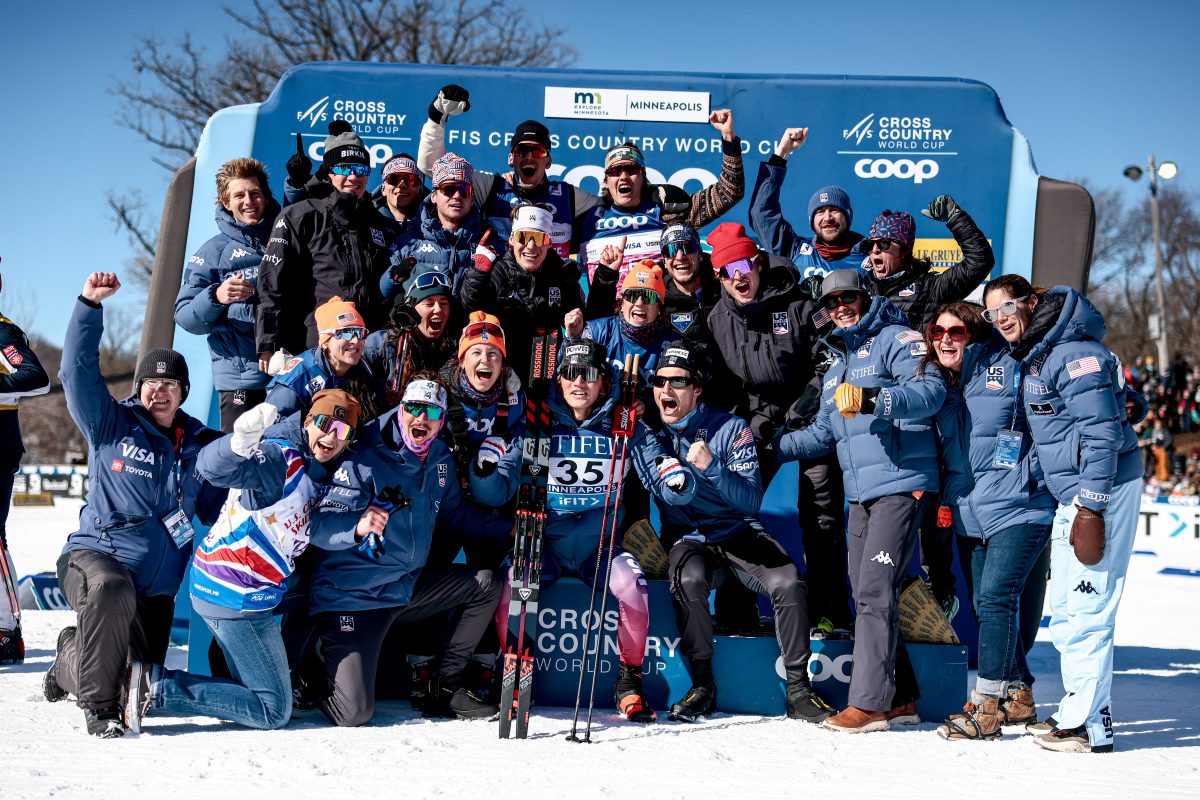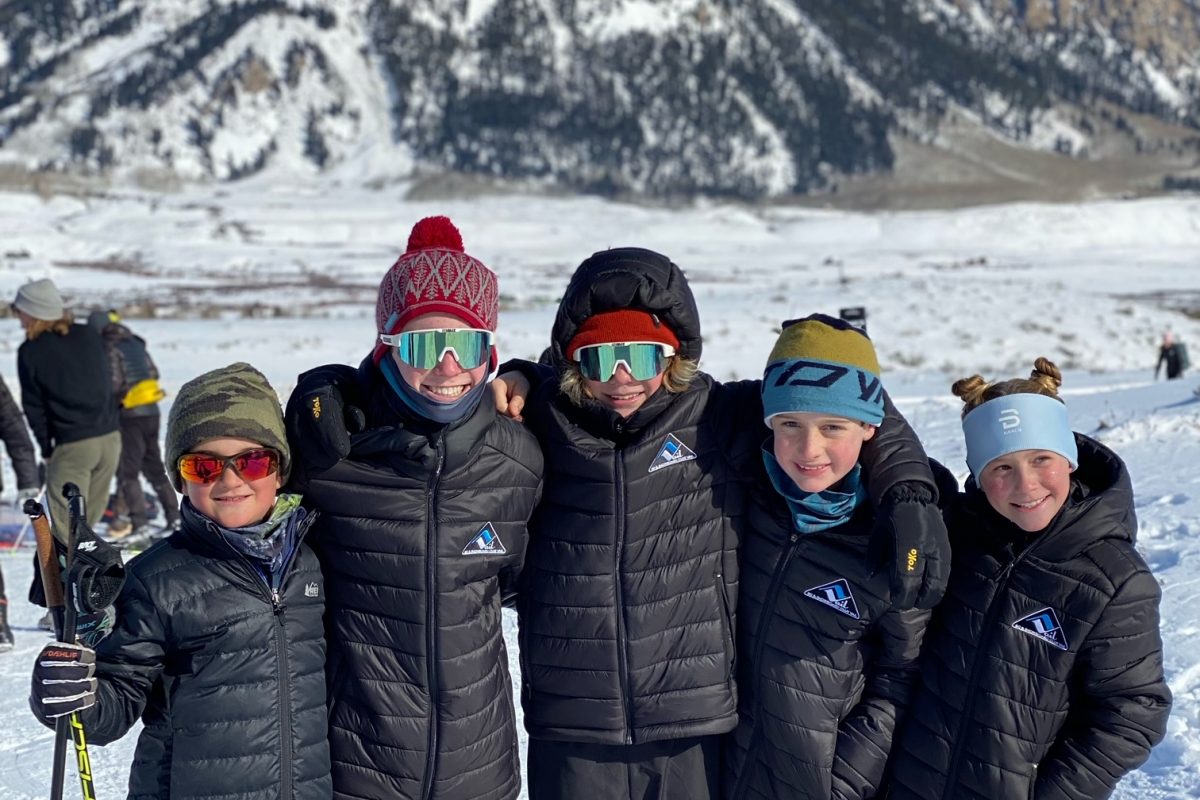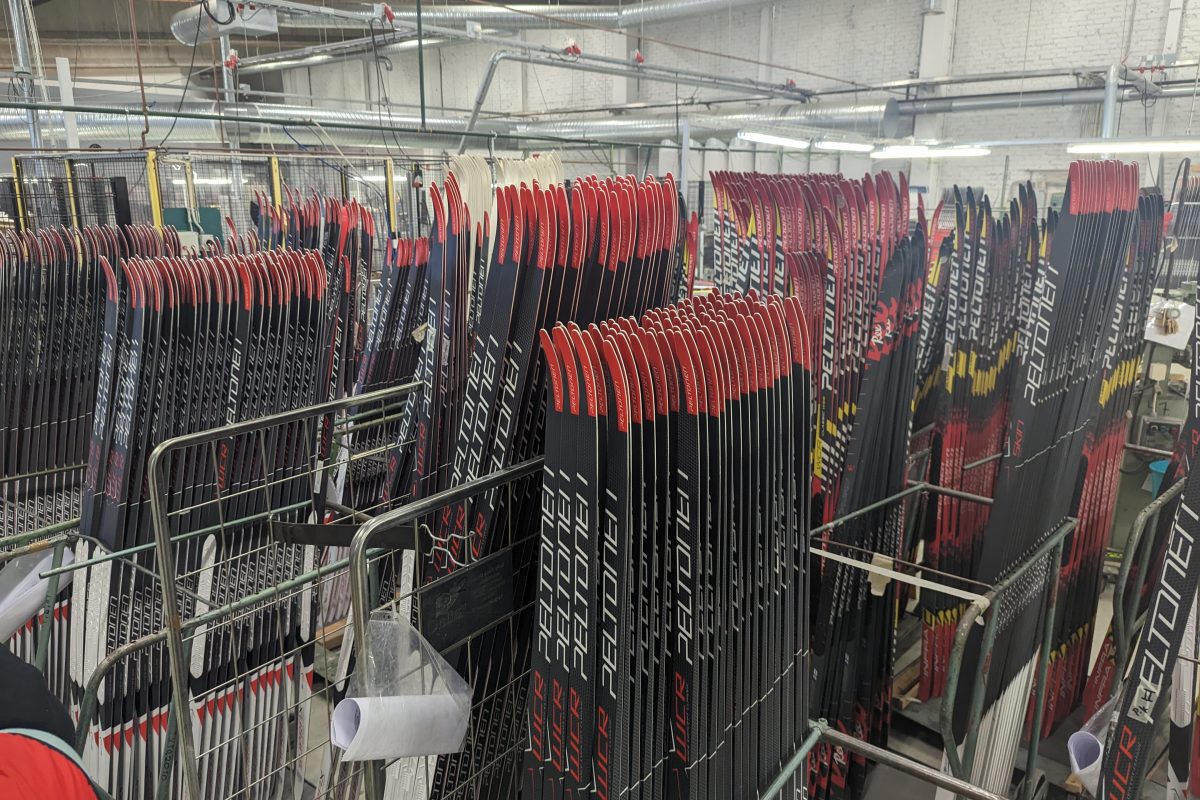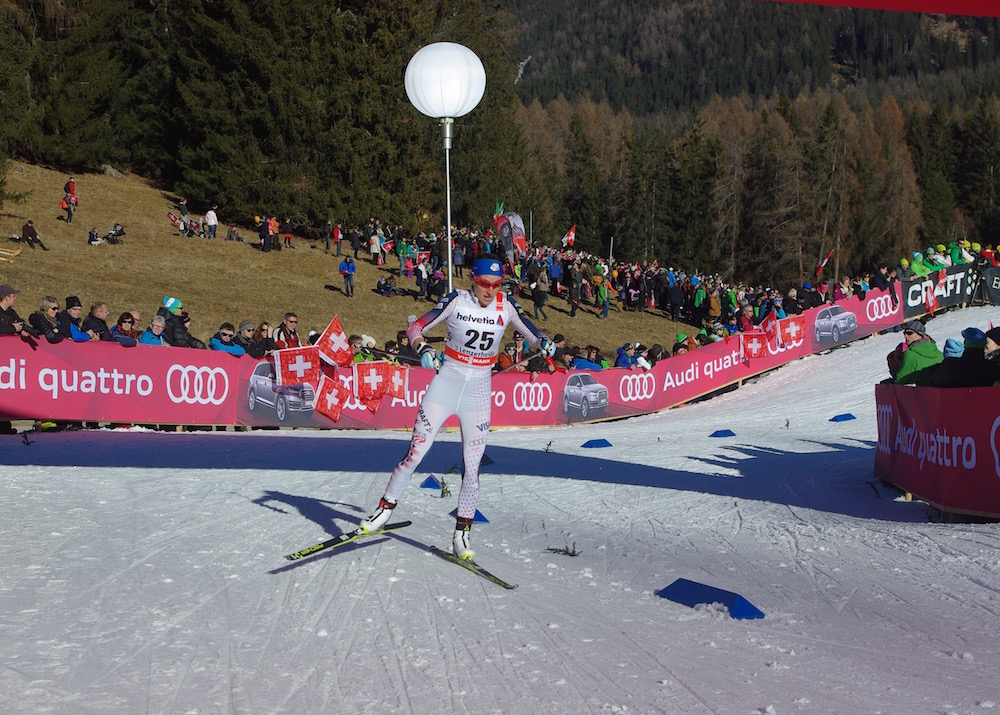
LENZERHEIDE, Switzerland — There was a scary moment for Sophie Caldwell in the quarterfinals of Friday’s World Cup sprint, the first stage of the 2016 Tour de Ski.
Saddled with one of the most competitive quarterfinals of the day, Caldwell got a slow start – which landed her at the back of the pack. She had skied the second-fastest qualifying time earlier in the day, but no matter what angle she tried it was hard for her to get to the front on the course’s one major climb, much less on the downhills.
“Super scary,” U.S. women’s coach Matt Whitcomb said of watching the heat unfold.

But the upside to being in a fast heat is that even if you finish fourth – as Caldwell did – you can make it to the semifinals as a lucky loser. Caldwell rode that luck all the way to the final and fourth place overall, changing her strategy along the way.
“I had a bit of a slow start in my quarterfinal so after that I put my focus on having a fast start and that was a lot better,” Caldwell said. “There were fewer people to go around and I think it’s just easier to keep your head in it when you’re battling for one of the top positions rather than sort of off the back scrambling.”
Caldwell took a hard inside line on the last downhill corner, putting her in potential podium position. But athletes reshuffled going up the last hill and into the stadium, and was left to edge out Astrid Uhrenholdt Jacobsen of Norway in a photo finish for fourth place, 1.03 seconds out of the win.
It was her best World Cup result since her podium in Lahti, Finland, at the end of the 2014 season.
“I am really happy,” Caldwell said. “Fourth is always sort of a bittersweet place to get. I want to be on that podium and I think I can one day. But this is the best result I’ve had in a long time so I’m really happy with it.”

Maiken Caspersen Falla of Norway won the day after qualifying in seventh position. She said that the course, with its drag-race uphills and few places to make any huge moves, fit her well.
“I felt better and better during all the heats,” Falla said in the post-race press conference. “I think the other girls are skiing really fast on the first lap. On the last lap I felt really good especially on the last uphill. I was first in the last 100 meters, so it’s really nice – as always – to get the World Cup victory.”
Falla leads the World Cup sprint standings this season.
Ida Ingemarsdotter of Sweden was second (+0.40), and Ingvild Flugstad Østberg of Norway third (+0.54). Ingemarsdotter made her decisive move late in the second lap. It was her second World Cup sprint final of the season, while Falla and Østberg are staples on the circuit.
“I had a good feeling and was satisfied with myself,” Ingemarsdotter told FasterSkier. “I knew that it’s two laps and it’s not the first lap that counts. It’s the whole way to the finish. I just focused on the second lap and when we went into the stadium I knew that if you can take any position there, you can take it cheap and you don’t have to work so hard.”
Both she and Østberg are looking forward to the whole Tour de Ski, not only the sprints. She’s “absolutely” going to enjoy more good distance racing, Ingemarsdotter said.
“Tomorrow is 15 k classic,” she explained. “I think the strong Norwegian girls will go really hard. I will focus as much as possible on following them, to keep the gap to the front not so big.”
And Østberg? She hasn’t gone all the way to the end of the Tour de Ski since 2012, but this year she has said she’s focusing on also doing excellent distance racing. So finishing the Tour de Ski is on the table.
“It’s a good start to the Tour,” she said in the press conference. “This year my plan is to go the whole way and up Alpe Cermis, so it’s important to have a good start. Tomorrow is another day with a lot of bonus seconds, so I guess overall standings will look different after tomorrow.”
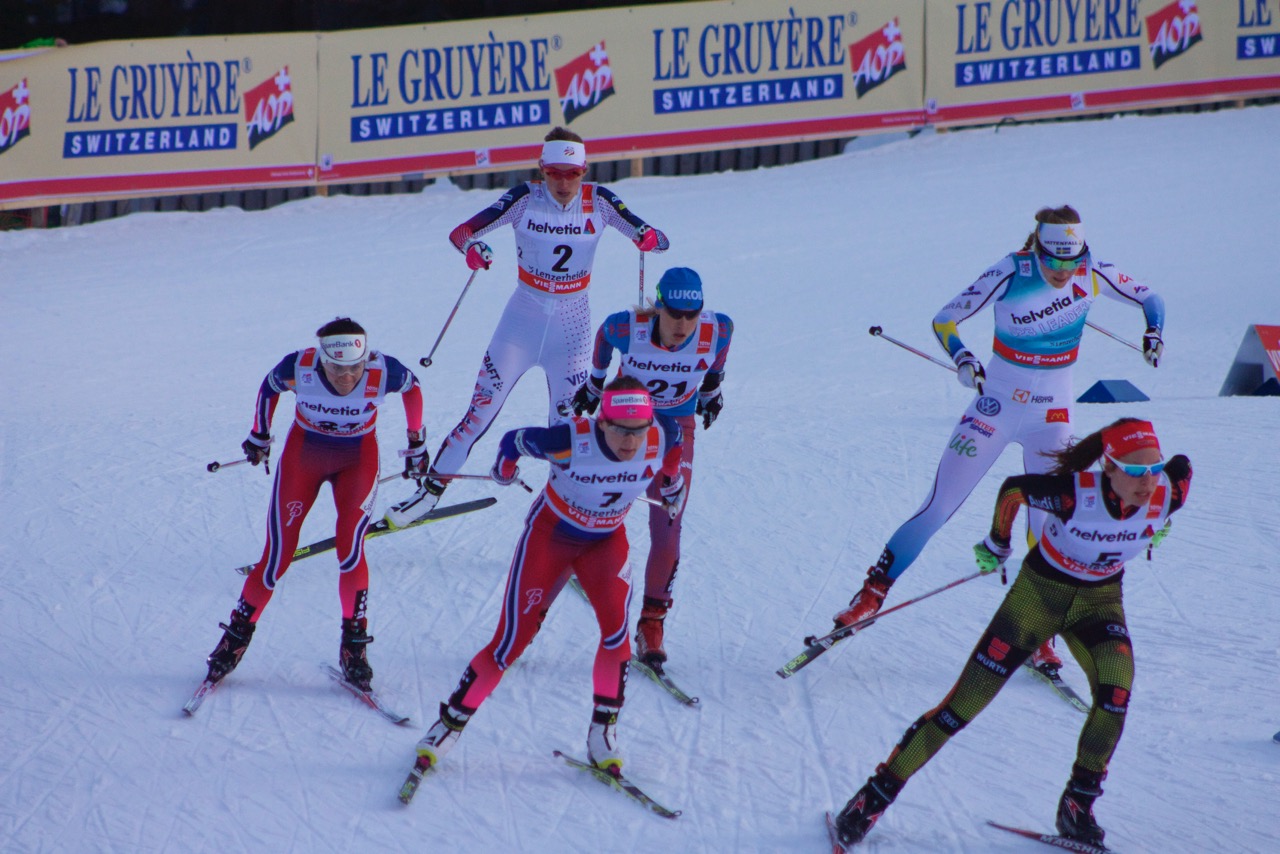
Caldwell isn’t as likely to go the whole way. Head coach Chris Grover said before the Tour began that she and the other sprint specialists would probably stop after the Oberstdorf, Germany, stages a few days from now.
But with four times racing around the course, Caldwell definitely got in her workout today.
“The semi and final were hard,” she said. “But I’ve been working really hard on recovering in between heats and in the qualifier today that was the best my legs have felt all year. So I was hoping to come into the Tour pretty rested and focusing on recovering between each heat. I think it worked.”
In fact, that’s one thing that U.S. women’s coach Matt Whitcomb picked out as a highlight of the day.
“The goal for Sophie is to try to skate through as many heats easily as she can, and she has certainly run into some very difficult heats this year,” he said. “But the nice thing about today is that Sophie had to dig really hard a couple of times, which smoked her in Davos. And it didn’t today. She was in the mix right in the end. So she has clearly taken a nice step in the direction.”
The reason that today’s quarterfinal and some others this season have been so hard is that athletes now pick their own heats, which can leave some easier and some harder than the former system, which automatically seeded athletes according to qualification position.
“The new heat selection process is interesting,” Caldwell said. “Sometimes it works in your favor and sometimes it doesn’t. I think so far this year I have to be the world’s luckiest loser. In about five of the six heats I’ve moved on in it has been as lucky loser. I have picked some fast heats, which is tough, because it’s hard to move on from. But then lucky losers come out of that heat so sometimes it’s a good thing.”
Whitcomb admitted that heat selection is something they are still working on. But part of the strategy is also to get each qualifier from the team into a different heat, if possible, so that they are less likely to bump each other out. With three other women (Jessie Diggins, Sadie Bjornsen, and Ida Sargent) qualifying today, that dynamic was at play.
“We’ve started to change our strategy [for picking heats] but with Stina [Nilsson] qualifying 28th and 30th in the last two weekends, it has thrown a huge wildcard into the mix,” Whitcomb said (Nilsson ended up sixth, 1.3 seconds behind Caldwell). “So still we’ll do our best to select easier heats moving forward, but you can only do your best when you’re also trying to get all four of your women into different heats.”
So far, though, things have worked out for Caldwell, even if she’s sometimes had to work harder than she or her coach would prefer.
After making it to the final she gave it her all, which is the most either of them could ask for.
“I knew it was going to be tight,” Caldwell said. “I can’t even remember what happened there, but positions can change a lot. People who were on the outside are all of a sudden on the inside and then unless you’re right in the front, you never know when someone is going to come over. So it’s tough. But I fought til the end and I’m happy with it.”
Chelsea Little
Chelsea Little is FasterSkier's Editor-At-Large. A former racer at Ford Sayre, Dartmouth College and the Craftsbury Green Racing Project, she is a PhD candidate in aquatic ecology in the @Altermatt_lab at Eawag, the Swiss Federal Institute of Aquatic Science and Technology in Zurich, Switzerland. You can follow her on twitter @ChelskiLittle.

